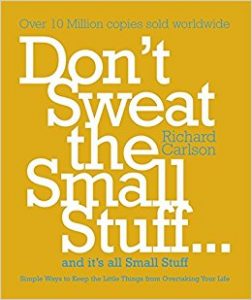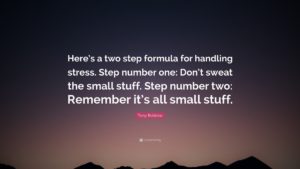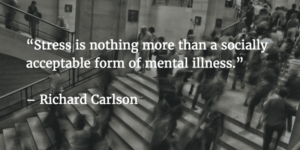Don’t Sweat The Small Stuff At Work
Author: Richard Carlson
Genre: Self Help, Management

A #1 Bestseller offering simple tips that bring out the best of us in work – by avoiding stress and anger over little things.
This book by Richard Carlson PhD (International lecturer, best-selling author) talks about how to minimize stress and bring out our best. It has a full 100 tips – some old wine, some new stuff, but all simple and easy to be applied.
The key hypothesis is: If we step back and really think about it, much of what bugs us on a day-to-day basis is actually the “small stuff” – traffic problems, constant deadlines, boring and long meetings, bureaucracy, requests not being answered, rude emails, demanding bosses, an assumed rat race, etc. [And/or the everyday tiffs with our spouses, the cranking of the kids]. The real problems –job layoffs, theft or violence – are really few and far between. Indeed, it’s all those little hassles that tend to drive us crazy.
And therefore, because there is so much “small stuff” to deal with at work, there is a direct correlation between the way you handle small stuff and your overall effectiveness at work. There’s no question that, if you learn to treat the smaller hassles with more perspective, wisdom, patience, and with a better sense of humor, you’ll begin to bring out the best in yourself. I have tried to enumerate a dozen of the more novel tips – simple and beautiful – and hope that we can all apply it in our lives:
1.Have some “No Phone time at work: – Really important messages would anyway have been left on the voicemail which you can cater to later. Even simple requests become “urgent” when asked over the phone.
2. Make the best of “Corporate Travel”: – Using it for learning new things. There are people who purchase language learning audio tapes, and on the plane, just close their eyes, relax and learn! And 100,000 miles later, they can speak Spanish! Similarly in the hotels, we may want to try yoga or meditation!
3. Create a bridge between your spirituality and your work: – The biggest advantage being that “small stuff” really starts feeling like small stuff. Jot down the key things you believe in and practice those in work: patience, kindness, forgiveness… These will help make us more effective.

4. Recognize patterns in behavior: – In ourselves and in our colleagues. There are people who habitually don’t respond to emails, others who are never on time, others who are generally rude. Instead of frustrating ourselves over their faults, it may help to recognize and hence avoid them.
5. Lower your expectations: – We expect our company to be ideal in people management practices, the people to be ideal in interaction, the pay to be best in class, and so on… While we ourselves are generally less than ideal in most respects! Frustration increases with expectations, not results per say.
6. Take advantage of your commute: – Just too many of us keep complaining about the horrible traffic conditions in both big cities. Can we use this time to learn something: buy audiotapes of famous books and thereby catch up on reading! People who practice this actually look forward to commuting!
7. Let go off battles that cannot be won: – Much of our frustration comes from things we have no control over, but are still unhappy about them. Just let go– there are other more important things where we can make a real difference.

8. Make allowance for incompetence: – Richard says that it is a fact of life – every place will have some highly competent people, most will be average, and few will lie towards the bottom. Hence, we will always run into some incompetence in our work life. Let’s just learn to take these in our stride.
9. Don’t get stressed by predictable: – There are flight attendants who get angry and frustrated every time there is a flight delay or some rude passengers– even though they are bright enough to understand that both these have to happen in their jobs!
10. Get out of the grumble mode: – While we keep on focusing on problems, always critical, frowning, angry; life is slipping by. Our chance of exploring its beauty as well as its hassles is very limited – but we take it for granted and waste our precious time just wishing life or other people were different!
11. Make someone else feel good: – It may sound as a noble lecture, but practically just the feeling of making someone else feel truly better, makes us feel good too… Giving, as they say, is its own reward – the warm, positive feelings that invariably accompany our efforts work wonders.
12. Spend ten minutes a day doing absolutely nothing: In the words of a CEO, “in the busiest of times, I slow down and relax”. A meditation or just watching the sunset or watching the fish in you aquarium or marveling at a tree. Unfortunately it is also the easiest habit to break!
Why should you read the book: This book will keep you from letting the little, stressful things in life – like your email inbox, daily commutation and annoying co-workers – drive you insane and help you find peace and calm in a chaotic world.

 This information will never be shared with third party
This information will never be shared with third party
Wonderful.. Thanks for the review. Keep it coming
You are genius. I love this novel concept of encouraging colleagues to read books by sharing summary and learning in advance. This is much better and useful than spending time through Instagram, facebook and what’s up. This will also help them to improve their work life balance.
Nice concept